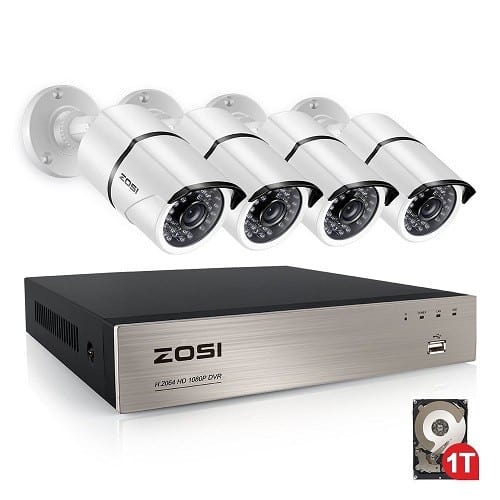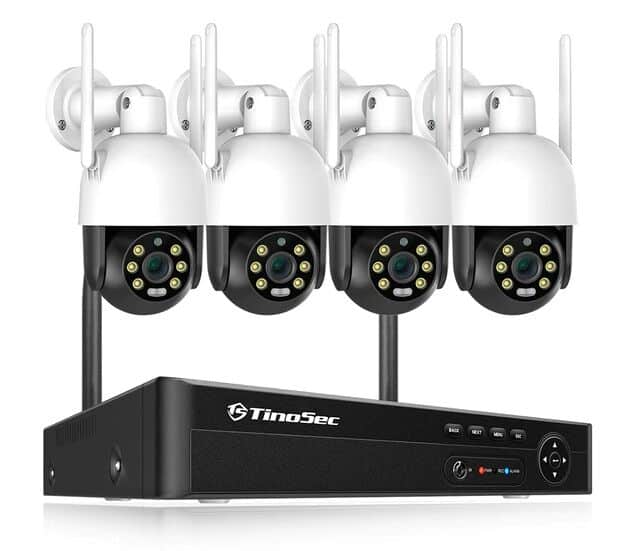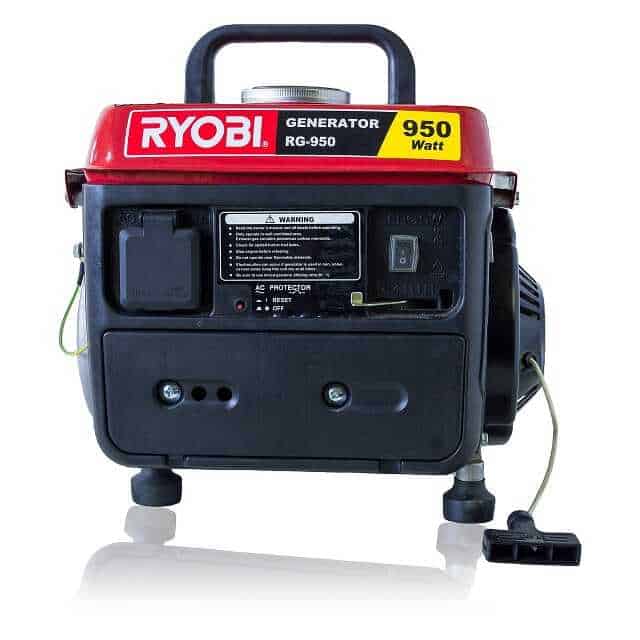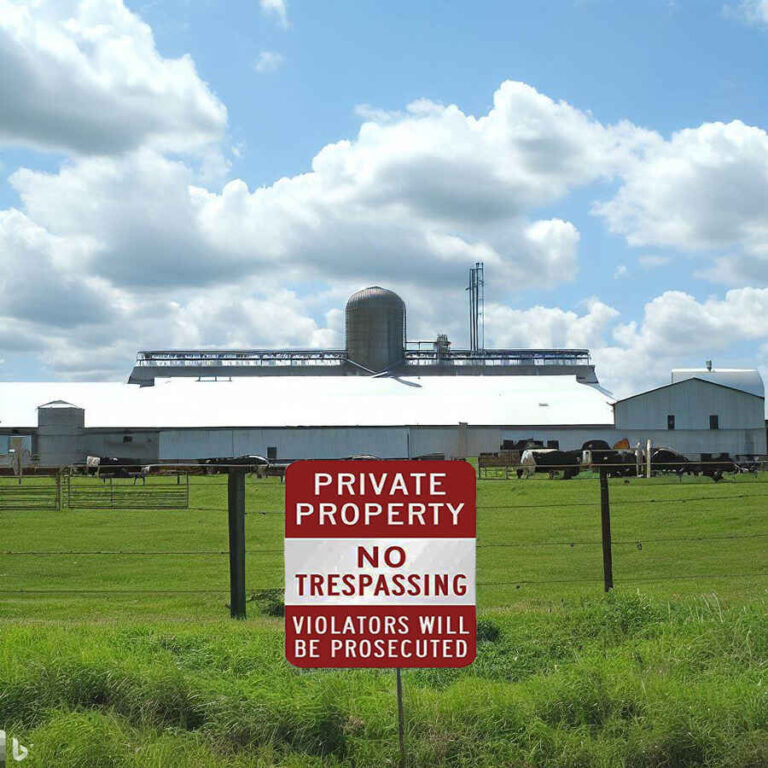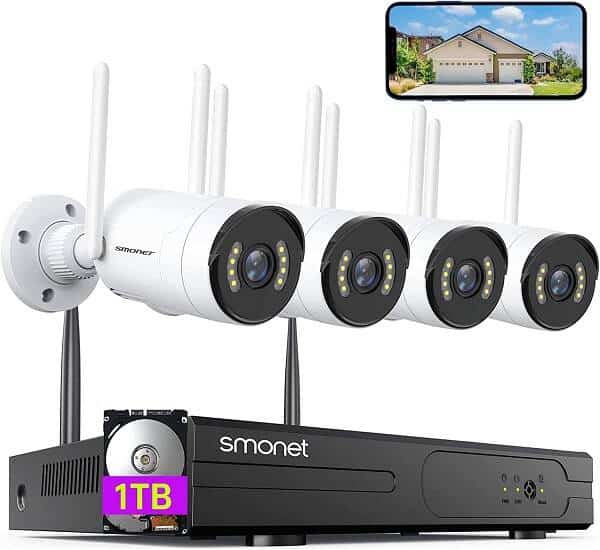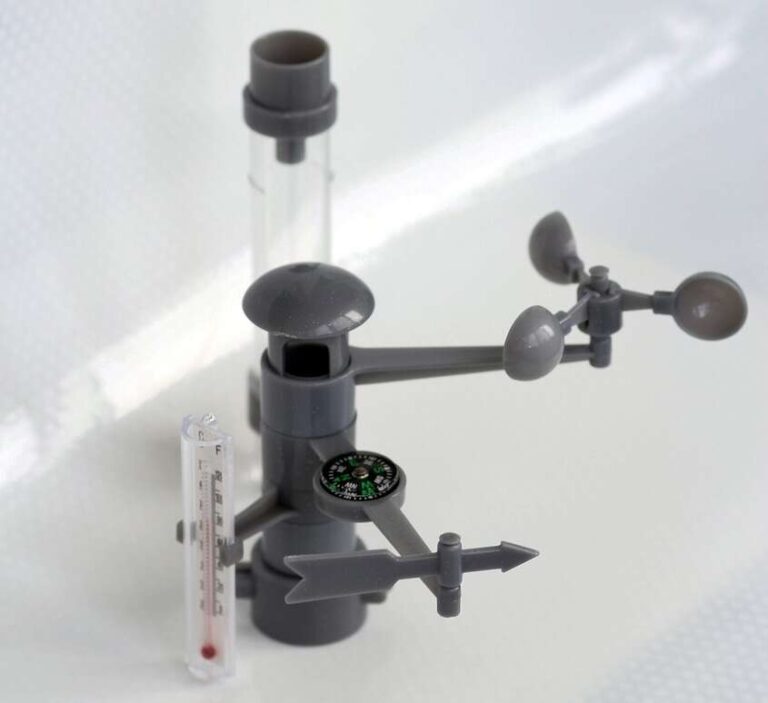Gas Leak Detector: A Comprehensive Guide
Gas leaks can be incredibly dangerous, leading to fires, explosions, and exposure to harmful chemicals. In order to prevent these hazardous situations, it’s important to invest in a reliable gas leak detector. But what are they and how do they work?
In this comprehensive guide, we’ll dive into the world of gas leak detectors, exploring the various types, how they work, key features to consider, common applications, and how to prevent gas leaks in the first place.
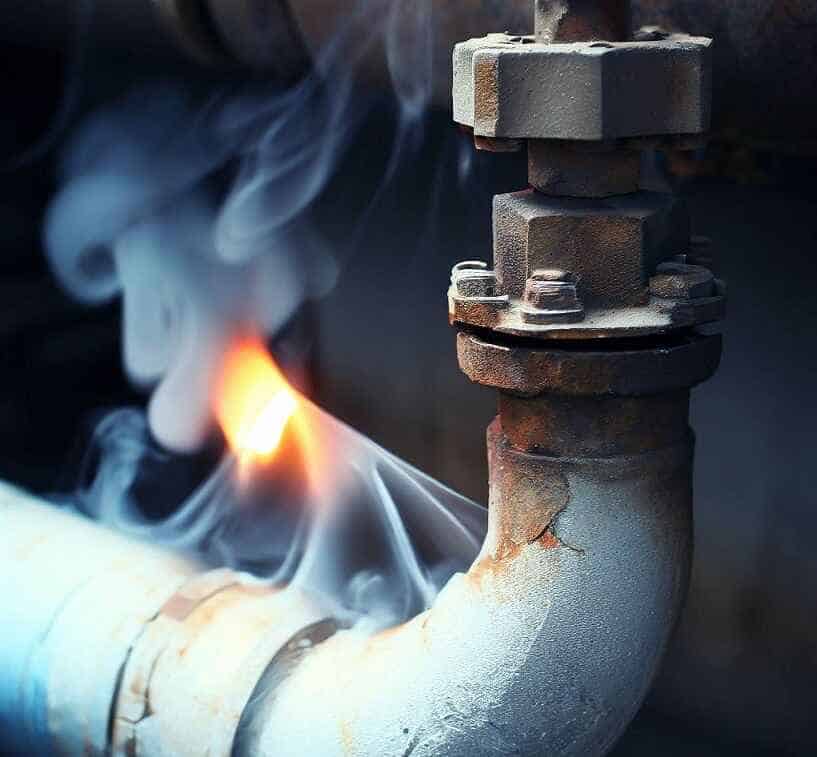
Types of Gas Leak Detectors
There are three main types of gas leak detectors: electronic, ultrasonic, and infrared. Each has its own set of advantages and disadvantages.
Electronic Gas Leak Detectors
Electronic gas leak detectors, also known as semiconductor detectors, use sensors to detect gas leaks. These sensors can detect a wide range of gases, including natural gas, propane, and other flammable gases. They’re highly sensitive and can be quite accurate when used properly.
Ultrasonic Gas Leak Detectors
Ultrasonic gas leak detectors work by detecting the sound of a gas leak. They’re not sensitive to the type of gas being leaked, but rather the noise generated by the leak itself. This means they can detect leaks in pressurized systems, regardless of the type of gas.
Infrared Gas Leak Detectors
Infrared gas leak detectors utilize infrared technology to detect the presence of gas. They can be highly accurate and are often used in industrial settings to monitor large areas for potential leaks.
How Gas Leak Detectors Work
Electronic Detection
Electronic gas leak detectors rely on sensors that react to the presence of a specific gas. When the gas comes into contact with the sensor, it changes the electrical conductivity of the sensor material, triggering an alarm.
Ultrasonic Detection
Ultrasonic gas leak detectors listen for the sound of a gas leak. They use microphones to pick up the high-frequency sound waves produced by the leak, and when the sound is detected, an alarm is triggered.
Infrared Detection
Infrared gas leak detectors use infrared cameras to detect the presence of gas. The cameras capture images of the environment and look for changes in the infrared spectrum that indicate the presence of gas.
Key Features to Consider
When selecting a gas leak detector, there are several key features to consider:
Sensitivity
The sensitivity of a gas leak detector is crucial for detecting even the smallest leaks. Look for a detector with adjustable sensitivity settings, so you can tailor it to your specific needs.
Response Time
A quick response time is important for detecting gas leaks as soon as possible, minimizing the potential for damage or harm. Choose a detector with a fast response time to ensure prompt notification in case of a leak.
Reliability
A reliable gas leak detector is essential for protecting your home or workplace from potential dangers. Look for detectors with a proven track record and positive user reviews.
Ease of Use
A gas leak detector should be easy to use and install. Opt for devices with clear instructions, user-friendly interfaces, and straightforward maintenance requirements.
Best Gas Leak Detectors
Klein Tools ET120 Gas Leak Detector
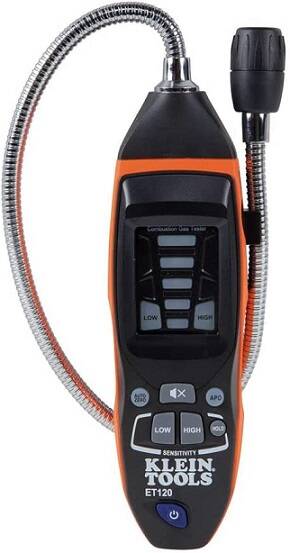
The Klein Tools ET120 Gas Leak Detector has quickly become an essential tool in my safety arsenal. With a detection range of approximately 50 to 10,000 ppm (based on Methane), this device offers two levels of sensitivity for versatile use. The visual and audible alerts are invaluable, providing clear warnings that increase with gas concentration.
The automatic zero-point calibration upon power-up ensures the device is always ready to use. I particularly appreciate the 18-inch flexible gooseneck that allows for easy access in tight spaces. And the over-molded body and comfortable grip make it a pleasure to handle. Plus, the auto power-off feature after 10 minutes of non-usage conserves battery life, which is very practical.
Klein Tools ET120 Gas Leak Detector is a reliable, user-friendly device that I would highly recommend for both professionals and homeowners alike.
Inficon-718-202-G1 Combustible Gas Detector
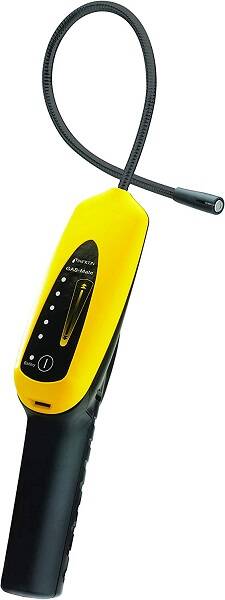
The Inficon-718-202-G1 Combustible Gas Detector has proven to be an incredibly reliable and efficient tool for detecting various gases. It can accurately detect natural gas, methane, propane, butane, cyclopentane, ethane, ethanol, isobutane, and ammonia, making it highly versatile. With an accuracy of 5 ppm methane, the device provides both audible noise and multiple LED indicators for clear and precise alerts.
The detector is powered by 2 Duracell Mn1300 D Alkaline batteries and is easy to use. Its 26-inch height, 3-inch width, and 3-inch depth make it a convenient size for various applications. The package includes a hydrocarbon gas sensor, batteries, and a plastic carrying case for portability and protection.
Designed and manufactured in the USA, the Inficon-718-202-G1 Combustible Gas Detector offers a modern, sleek appearance in yellow and black. Its performance and ease of use make it a must-have for professionals in need of a dependable gas detection solution.
UEi Test Instruments CD100A Combustible Gas Leak Detector
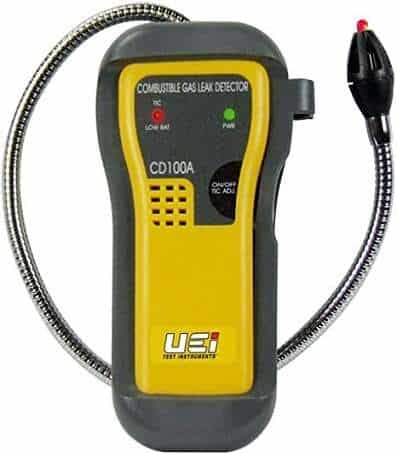
The UEi Test Instruments CD100A Combustible Gas Leak Detector is an indispensable tool for both residential and commercial HVAC needs. This comprehensive handheld detector is capable of identifying various gases, including acetone, ammonia, butane, methane, natural gas, LPG, and jet fuel. It’s incredibly easy to use, warming up in just 10 seconds before you can start detecting leaks with the help of audio and visual cues.
The 18-inch flexible gooseneck is perfect for accessing tight spaces, and the tip light at the end allows for leak detection in dark environments. This combustion gas leak detector is both efficient and effective, saving time compared to traditional soap methods.
The CD100A comes with 4 AA batteries and offers a 15-hour average battery life, making it a reliable and long-lasting tool. The device also includes a 1-year limited warranty, providing peace of mind for users. Overall, the UEi Test Instruments CD100A is an excellent investment for homeowners, HVAC contractors, and professionals working in industrial and residential environments.
INFICON Whisper Ultrasonic Leak Detector
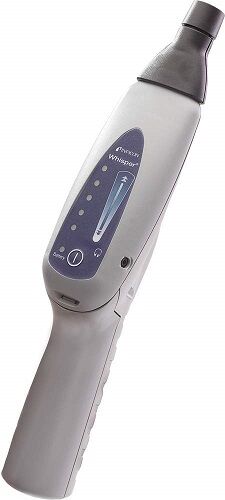
The INFICON Whisper Ultrasonic Leak Detector is a versatile and reliable tool for detecting pressure and vacuum leaks in all types of gases. Using advanced ultrasonic technology, the Whisper can identify leaks even in noisy environments, making it perfect for various applications.
One of the standout features of this leak detector is the included headphones, allowing you to hear the leak clearly. The laser pointer also helps in pinpointing the exact location of the leak. It’s particularly useful for detecting pressurized nitrogen leaks, setting it apart from other detectors on the market.
The Whisper runs on two D-cell alkaline batteries and comes with a rugged carrying case for added protection. The product is proudly made in the United States, and US technician support is available via email and phone.
This ultrasonic leak detector is ideal for various applications, including pressure/vacuum leaks, electrical arcing, malfunctioning steam traps, and more. The INFICON Whisper is an excellent investment for professionals in need of a reliable and efficient leak detection solution.
| Feature | Klein Tools ET120 | Inficon-718-202-G1 | UEi Test Instruments CD100A | INFICON Whisper Ultrasonic |
|---|---|---|---|---|
| Detection Range | 50 to 10,000 ppm (Methane) | Various gases | Acetone, ammonia, butane, etc. | Pressure and vacuum leaks for all gases |
| Flexible Gooseneck | 18-inch | N/A | 18-inch | N/A |
| Audible & Visual Alerts | Yes | Yes | Yes | Yes (using headphones) |
| Detection Technology | Standard | Standard | Standard | Ultrasonic |
| Unique Features | Automatic zero-point calibration | Multiple LED indicators | Tip light at the end of gooseneck | Laser pointer |
| Battery Type | 4 AAA | 2 Duracell Mn1300 D | 4 AA | 2 D-cell alkaline |
| Warranty | N/A | N/A | 1-year limited | N/A |
| Best for | Residential and commercial use | Professionals requiring versatility | Homeowners, HVAC contractors | Professionals seeking versatility in various scenarios |
Common Applications
Gas leak detectors are used in various settings, including:
- Residential homes: to detect natural gas, propane, or other flammable gas leaks that could pose a risk to occupants.
- Industrial facilities: to monitor for hazardous gas leaks that could lead to fires, explosions, or toxic exposure.
- Commercial buildings: to ensure the safety of occupants and compliance with local regulations regarding gas leak detection.
- Gas pipelines and distribution systems: to identify leaks in the infrastructure and reduce the risk of accidents or environmental damage.
Preventing Gas Leaks
While having a gas leak detector is crucial, it’s also important to take preventative measures to reduce the risk of gas leaks in the first place. Here are some tips:
- Regularly inspect and maintain gas appliances, ensuring they’re in good working condition.
- Hire a qualified professional to install gas appliances and perform any necessary repairs.
- Educate yourself and others on the signs of a gas leak, such as a rotten egg smell or hissing sounds near gas lines.
- Be aware of the locations of gas lines and avoid digging or drilling near them without proper precautions.
- Install gas shutoff valves on all gas appliances for easy access in case of an emergency.
Conclusion
Gas leak detectors are an essential tool for maintaining a safe and secure environment, whether in residential, commercial, or industrial settings. By understanding the different types of detectors, how they work, and the key features to consider, you can make an informed decision when selecting the right gas leak detector for your needs. Remember to also take preventative measures to minimize the risk of gas leaks, ensuring the safety of everyone involved.
FAQs
How often should I check my gas leak detector?
It’s a good idea to test your gas leak detector regularly, at least once a month, to ensure it’s functioning properly.
Can a gas leak detector detect carbon monoxide?
Some gas leak detectors are specifically designed to detect carbon monoxide, while others are not. Be sure to check the specifications of the detector you’re considering to ensure it can detect the gases you’re concerned about.
What should I do if my gas leak detector goes off?
If your gas leak detector goes off, you should immediately evacuate the area, turn off any gas appliances, and call emergency services or a qualified professional to inspect and address the situation.
How much does a gas leak detector cost?
Gas leak detectors can range in price from around $20 for basic models to several hundred dollars for more advanced, feature-rich devices.
Where should I install my gas leak detector?
Install your gas leak detector near potential gas leak sources, such as gas appliances or gas lines, and in areas where gas may accumulate, like basements or crawl spaces. Follow the manufacturer’s recommendations for proper placement.
Other articles you might find useful:
Best Radon Detector and what you need to know before buying
What To Do If Someone Blocks Your Driveway
Long Range Security Cameras for Homeowners and Small Businesses: The Ultimate Guide
Disclaimer
Certain content that appears on this site comes from Amazon. As an Amazon Associate we earn from qualifying purchases. Read full Disclaimer Here!

